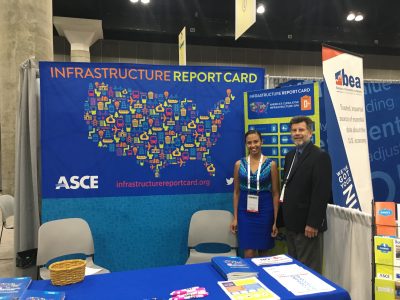ASCE participated this week in the National Conference of State Legislatures (NCSL) annual Legislative Summit. Approximately 5,500 state legislators, legislative staff, decision-makers, and others attended the meeting to hear from experts and fellow legislators about policy challenges we face today and solutions to these challenges.
ASCE exhibited at the 2018 Legislative Summit, and several volunteers from ASCE’s Region 9 joined to staff our booth and speak with lawmakers about the need to increase investment in infrastructure. Thank you to the Region 9 Members who volunteered:
- Ken Rosenfield, P.E., F.ASCE
- Liz Ruedas, P.E., M.ASCE
- Dana Robertson, P.E., M.ASCE

“NCSL is an effective way to meet state legislators and share ASCE priorities,” said Ken, ASCE Region 9 Vice-Chair and Governor At-Large. “I spoke with elected officials from several states at the ASCE booth, sharing with them our Infrastructure Report Cards and recommendations to raise the grades. Importantly, I also heard from lawmakers about what matters to their constituents and discussed how ASCE can help them advance infrastructure investment and prioritization in their home states.”
Attendees participated an array of policy-producing committee meetings, issue forums and deep-dive sessions. The Summit featured several infrastructure themed sessions:
- ASCE participated in a half day energy summit that explored the major technological trends transforming the electricity and transportation sector. Sessions focused on transportation fuels of the future, smart communities, and debated the effectiveness of policies pushing for electrification of appliances and lower energy bills.
- “Natural Disasters: How Data Helps Build Resilience” provided a deep dive into the how states were tracking disaster spending and overviewed new tools that better foster collaboration and mitigate risks.
- “The Intersection of Antitrust Laws and Occupational Licensing” explored the impacts of a 2015 Supreme Court ruling which said states must actively supervise occupational licensing boards to protect from antitrust liability.
- “Trends in Transportation Funding,” provided state lawmakers with a primer on how states are approaching alternative source of revenue to replace or supplement the motor fuel tax. One takeaway from this session was clear: States that have piloted a pay-per-mile road charge pilot program are grappling with higher administrative costs than seen under the traditional “pay at the pump” model. How to cost-effectively collect revenue from pay-per-mile drivers remains to be seen.
Next year’s Summit will take place in August in Nashville, Tennessee.
